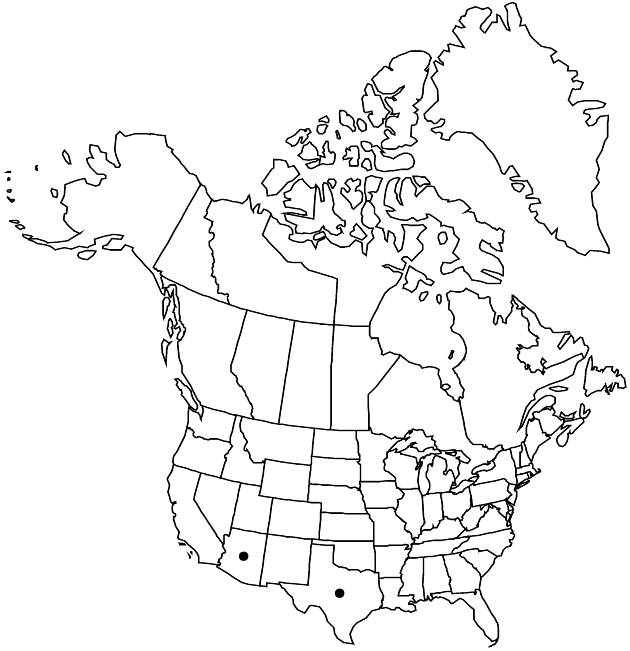Difference between revisions of "Pseudognaphalium arizonicum"
Opera Bot. 104: 147. 1991.
FNA>Volume Importer |
imported>Volume Importer |
||
| (6 intermediate revisions by 2 users not shown) | |||
| Line 8: | Line 8: | ||
}} | }} | ||
|common_names=Arizona rabbit-tobacco | |common_names=Arizona rabbit-tobacco | ||
| − | |basionyms={{Treatment/ID/ | + | |basionyms={{Treatment/ID/Basionym |
|name=Gnaphalium arizonicum | |name=Gnaphalium arizonicum | ||
|authority=A. Gray | |authority=A. Gray | ||
| + | |rank=species | ||
| + | |publication_title=Proc. Amer. Acad. Arts | ||
| + | |publication_place=19: 3. 1883 | ||
}} | }} | ||
|synonyms= | |synonyms= | ||
| Line 27: | Line 30: | ||
|elevation=1600–2300 m | |elevation=1600–2300 m | ||
|distribution=Ariz.;Tex.;w Mexico. | |distribution=Ariz.;Tex.;w Mexico. | ||
| − | |discussion=<p>Pseudognaphalium arizonicum is superficially similar to P. stramineum in its narrow, concolor leaves; P. stramineum has non-decurrent leaves, light yellowish phyllaries, and more pistillate and bisexual florets.</p> | + | |discussion=<p><i>Pseudognaphalium arizonicum</i> is superficially similar to <i>P. stramineum</i> in its narrow, concolor leaves; <i>P. stramineum</i> has non-decurrent leaves, light yellowish phyllaries, and more pistillate and bisexual florets.</p> |
|tables= | |tables= | ||
|references= | |references= | ||
| Line 36: | Line 39: | ||
-->{{#Taxon: | -->{{#Taxon: | ||
name=Pseudognaphalium arizonicum | name=Pseudognaphalium arizonicum | ||
| − | |||
|authority=(A. Gray) Anderberg | |authority=(A. Gray) Anderberg | ||
|rank=species | |rank=species | ||
| Line 51: | Line 53: | ||
|publication year=1991 | |publication year=1991 | ||
|special status= | |special status= | ||
| − | |source xml=https:// | + | |source xml=https://bitbucket.org/aafc-mbb/fna-data-curation/src/2e0870ddd59836b60bcf96646a41e87ea5a5943a/coarse_grained_fna_xml/V19-20-21/V19_698.xml |
|tribe=Asteraceae tribe Gnaphalieae | |tribe=Asteraceae tribe Gnaphalieae | ||
|genus=Pseudognaphalium | |genus=Pseudognaphalium | ||
Latest revision as of 19:54, 5 November 2020
Annuals or perennials, 20–50 cm; taprooted. Stems loosely and densely woolly-tomentose (hairs usually with reddish or purplish cross walls), not glandular. Leaf blades linear-oblanceolate to linear-lanceolate, 2–6 cm × 2–7 mm, bases not clasping, decurrent 3–15(–20) mm, margins weakly and narrowly revolute, faces concolor to weakly bicolor, tomentose (hairs commonly with reddish or purplish cross walls), not glandular. Heads borne singly or in terminal glomerules or corymbiform arrays. Involucres turbinate-campanulate, 5–6 mm. Phyllaries in 4–5 series, usually brownish to tawny, rarely slightly rosy (opaque, shiny), ovate-lanceolate to lanceolate, glabrous. Pistillate florets (25–)30–49. Bisexual florets (1–)3–6. Cypselae ridged, papillate-roughened.
Phenology: Flowering Aug–Sep.
Habitat: Open woodlands and chaparral [wide ranging habitats in Mexico, agricultural land to oak and pine woodlands]
Elevation: 1600–2300 m
Distribution

Ariz., Tex., w Mexico.
Discussion
Pseudognaphalium arizonicum is superficially similar to P. stramineum in its narrow, concolor leaves; P. stramineum has non-decurrent leaves, light yellowish phyllaries, and more pistillate and bisexual florets.
Selected References
None.